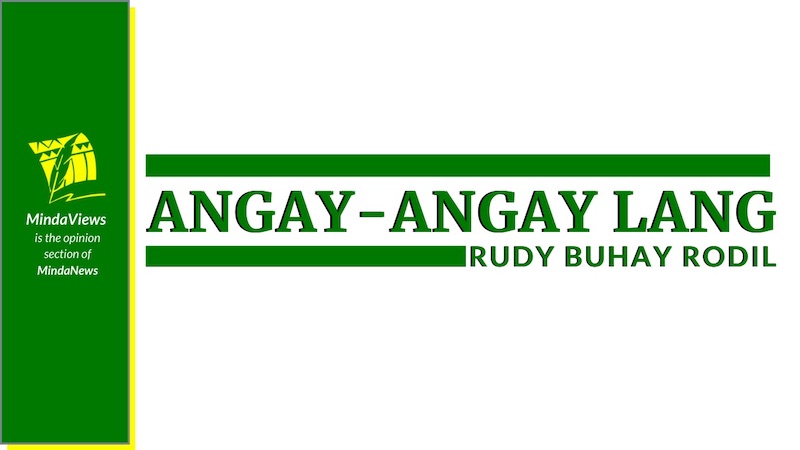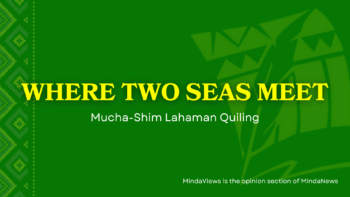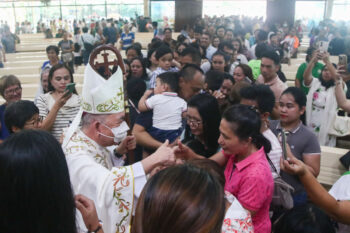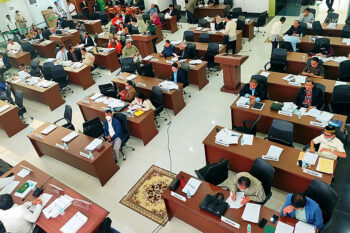
Session with Experts
Part of the GPH-MILF Peace Negotiation
On the occasion of Transitional Justice and Reconciliation Commission (TJRC), Chair was Mrs. Mô Bleeker of Swiss Government
Marco Polo, Davao City
24-25 November 2014
ILIGAN CITY (MindaNews / 14 Oct) – My other thoughts on the legitimate grievances, historical injustices, the human rights and marginalization, all left behind from our colonial past:
Legitimate Grievances
Legitimate grievances is an open concept, undefined, not acceptable to all. It is also a feeling, an emotion with corresponding energy. In short, we are dealing with live people.
The best thing really is to do consultation with those who are directly affected by the conflict, and talk to the people themselves.
When they see that people who care go out of their way and come to talk to them, this gesture generates a lot of positive energy and open the way towards reconciliation and harmony.
Grievances means felt problems; how they feel about it will say what they expect is the response, at least initially. The consultation report should show the measurable dimensions of the problem, as well as the feeling portion, and whether their expected response is implementable.
Historical Injustice
Even historical injustice is another open concept. What is the meaning of historical? What is the meaning of injustice? Two ideas will be read depending on where one stands, with respect to the story we are reading.
To rewrite Mindanao-Sulu history will involve professional historians but because we only have a few of them, these few do not stand in the same political arena, and the same emotional arena, they are themselves part of the social divide among the citizens.
Forming an assembly of historians is already a huge problem in itself because they, too, are part of the problem.
What I have been doing was correcting the historical errors in existing books being used in schools, in my own classes, since my first year in teaching in Notre Dame of Jolo, 1967-68, and since I was team leader in the project to write the History of Mindanao in Nov 1999 to 2004, and the series of History Teachers’ Training (two batches) in 2004, and (three batches) in 2010, I feel strongly that the problem is urgent and need not wait for others to do it.
Human Rights
Human rights, too, need to be defined. What is the meaning of “human”? what is the meaning of “rights”?
Within the context of tribal custom, thirteen tribes already among the Muslims, blending within the context of Islam, including all the Lumad and other migrants within the context of a new political order, within the progress of long, twists and turns, ups and downs of history from way, way back to the present.
How far back in time do we go in the historical period, human right is colored by social ranks, view of women is also colored by social ranks, now there is the new element of democracy and international developments as reflected in UN declarations.
Even the meaning of violations, it varies depending on social ranks; also the penalties; also as within the perspective of the current judicial system being. This last is, as an institutional system, not keen on conscious on mutual acceptance, harmony and peace of the conflict-affected persons and their place in their respective communities.
In existing traditional systems in the country, any conflict, no matter how bloody, always ends in husay … sandugo … kapatiran.
In English, it is the one and only goal of any settlement of conflicts, to restore mutual acceptance, harmony and peace of the community.
At the end of convergence, a Timuay Manobo once stated: Mindanao is the clay pot (palayok) standing on the three pieces of stones (tungtungan), representing each of the Bangsamoro, Lumad and migrants, largely Christian, as equal in dignity.
Correcting historical injustice as part of Normalization
The appearance of “historical injustice” as an integral part of Normalization in the GPH-MILF peace agreement, to me, is a not only the affirmation of the legitimate grievances of the Bangsamoro. I was on the right path in my own writings on Mindanao history and in my own teachings in class, in my lectures wherever I was invited to discuss Mindanao History. Now, given the current status of peace process, more specifically in the work of the TJRC, I also realize that the effort I started many years ago must go on, on a bigger scale. The History Teachers’ Training, too, must go on. As soon as possible.
The forming of the TJRC and the session we had in Marco Polo was a happy reunion. Most of them were people I have worked with. The word “experts” has no meaning to me. I prefer the word “mission.” A “cause.” Or “our life.” A “lifetime.” A “sharing of thoughts.”
Pursuing correcting historical errors is a never-ending process. Actors in history will always disagree. We can only relate the corrections to what people think, their level of consciousness.
That is why I think in terms of “long term”, “in stages”, in “making history”, meaning we are not only correcting historical errors, we are also actually writing a new history.
Or coming to terms. The history-makers include the TJRC, the normalization, the whole peace process. Husay is being re-lived, perhaps, in unofficial efforts.
In my first book (Rad D. Silva was my pseudonym), Two Hills in the Same Land (1978), the book opened with a letter to Abdul, followed by touching recall of history and ended the same letter. Here are selected extracts which, I feel, are still very relevant:
Dear Abdul, Moro friend and brother,
It is more than four hundred years since the Mindanao conflict started … the issue of our brotherhood is very much under question. The little goodwill cultivated among a few has been transformed into an atmosphere of hostility.
The Mindanao problem is clearer to me now. I hope it is clearer to you, too. Its enormous weight is upon me – all over. But I am no longer disturbed. I am at peace, with a steady glow burning within. I feel I now stand on firmer ground. Our difference, I am certain, is not of our own making. Nor is it beyond repair.
You said we cannot live together because you are Moro and I am Filipino. Am I not also the son of Rajah Sulayman of Manila, that Moro who said to Martin de Goiti in 1570: “He was pleased to be the friend of the Spaniards, but the latter should understand… that they would not tolerate any abuse… on the contrary, they would repay with death the least thing that touched their honor.” I remember his words well, my brother. Nor have I forgotten that among my closest friends, it was a Moro who said to me: “You are my friend, I‘ll die for you should anyone cause you dishonor.”
I am happy that you are proud you are a Moro. Now I am sure it is not just a name. It carries the weight of more than three hundred years of determined struggle against foreign domination. Blood and lives were always willing to pay to remain free, to protect your honor. You maratabat is rooted on solid ground. It must be kept alive.
I ask against that you accept me as a Filipino. If in the past I said I was proud to be one, I am even prouder now. The name, I discovered after we parted, was used originally and pejoratively for Spaniards who were born in the Philippines. But from Rizal to 1898, the essence of that name has been radically transformed. We have transformed it through struggle. With lives and blood, we wrested it from our conquerors and made it our own. It is stamped with the blood of our fathers, it now stands for freedom. Upon this rests my maratabat.
It is with a deep sense of sorrow and anger that I see the grave wrongs we have committed against your people. But words, I know, are not enough; they will never be. Rajah Sulayman, my Moro friends, your history and mine – they all have taught me that it is not enough to have a common origin. We must also have a common vision.
The mutual hostility between your people and mine was sown and nurtured in times past.
The situation now is different.
New enemies have emerged, new friendships must be born.
[Si Prof. Rudy Buhay Rodil ay aktibong historyan ng Mindanao, tagapasulong ng kalinaw (Bisaya sa kapayapaan). Kilala siyang espesyalista sa paghusay ng mga gusot sa Mindanao-Sulu. Naging Komisyoner noon ng Regional Consultative Commision sa siyang nagbuo ng draft organic law ng Autonomous Region in Muslim Mindanao noong 1988. Dalawang beses siyang naging miyembro ng GRP Peace Negotiating Panel. 1993-1996, pakikipag-usap sa Moro National Liberation (MNLF), at noong 2004-2008 sa pakikipag-negosasyon sa Moro Islamic Liberation Front (MILF). Naging visiting propesor sa Hiroshima University, Oktubre-Disyembre 2011. Nagretiro noong Oktubre 2007.]







